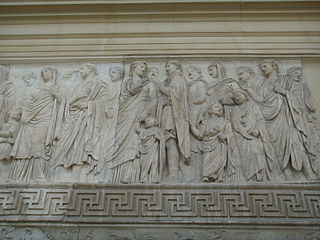Related Research Articles
Marcus Cornelius Fronto, best known as Fronto, was a Roman grammarian, rhetorician, and advocate. Of Berber origin, he was born at Cirta in Numidia. He was suffect consul for the nundinium of July-August 142 with Gaius Laberius Priscus as his colleague. Emperor Antoninus Pius appointed him tutor to his adopted sons and future emperors, Marcus Aurelius and Lucius Verus.

Pudicitia was a central concept in ancient Roman sexual ethics. The word is derived from the more general pudor, the sense of shame that regulated an individual's behavior as socially acceptable. Pudicitia was most often a defining characteristic of women, but men who failed to conform to masculine sexual norms were said to exhibit feminizing impudicitia, sexual shamelessness. The virtue was personified by the Roman goddess Pudicitia, whose Greek equivalent was Aidos.

Arrian of Nicomedia was a Greek historian, public servant, military commander and philosopher of the Roman period.
The pater familias, also written as paterfamilias, was the head of a Roman family. The pater familias was the oldest living male in a household, and could legally exercise autocratic authority over his extended family. The term is Latin for "father of the family" or the "owner of the family estate". The form is archaic in Latin, preserving the old genitive ending in -ās, whereas in classical Latin the normal first declension genitive singular ending was -ae. The pater familias always had to be a Roman citizen.

Freeborn women in ancient Rome were citizens (cives), but could not vote or hold political office. Because of their limited public role, women are named less frequently than men by Roman historians. But while Roman women held no direct political power, those from wealthy or powerful families could and did exert influence through private negotiations. Exceptional women who left an undeniable mark on history include Lucretia and Claudia Quinta, whose stories took on mythic significance; fierce Republican-era women such as Cornelia, mother of the Gracchi, and Fulvia, who commanded an army and issued coins bearing her image; women of the Julio-Claudian dynasty, most prominently Livia and Agrippina the Younger, who contributed to the formation of Imperial mores; and the empress Helena, a driving force in promoting Christianity.
Irrumatio is a form of oral sex where a man thrusts his penis into someone else's mouth, in contrast to fellatio where the penis is being actively orally excited by a fellator. The difference lies mainly in which party takes the active part. By extension, irrumation can also refer to the sexual technique of thrusting the penis between the thighs of a partner, or between the abdomens of two men.
Richard John Alexander Talbert is a British-American contemporary ancient historian and classicist on the faculty of the University of North Carolina at Chapel Hill, where he is William Rand Kenan, Jr., Professor of Ancient History and Classics. Talbert is a leading scholar of ancient geography and the idea of space in the ancient Mediterranean world.

Sexual attitudes and behaviors in ancient Rome are indicated by art, literature, and inscriptions, and to a lesser extent by archaeological remains such as erotic artifacts and architecture. It has sometimes been assumed that "unlimited sexual license" was characteristic of ancient Rome. Verstraete and Provençal opine that this perspective was simply a Christian interpretation: "The sexuality of the Romans has never had good press in the West ever since the rise of Christianity. In the popular imagination and culture, it is synonymous with sexual license and abuse."

Homosexuality in ancient Rome often differs markedly from the contemporary West. Latin lacks words that would precisely translate "homosexual" and "heterosexual". The primary dichotomy of ancient Roman sexuality was active/dominant/masculine and passive/submissive/feminine. Roman society was patriarchal, and the freeborn male citizen possessed political liberty (libertas) and the right to rule both himself and his household (familia). "Virtue" (virtus) was seen as an active quality through which a man (vir) defined himself. The conquest mentality and "cult of virility" shaped same-sex relations. Roman men were free to enjoy sex with other males without a perceived loss of masculinity or social status, as long as they took the dominant or penetrative role. Acceptable male partners were slaves and former slaves, prostitutes, and entertainers, whose lifestyle placed them in the nebulous social realm of infamia, excluded from the normal protections accorded to a citizen even if they were technically free. Although Roman men in general seem to have preferred youths between the ages of 12 and 20 as sexual partners, freeborn male minors were off limits at certain periods in Rome, though professional prostitutes and entertainers might remain sexually available well into adulthood.
Elaine Fantham was a British-Canadian classicist whose expertise lay particularly in Latin literature, especially comedy, epic poetry and rhetoric, and in the social history of Roman women. Much of her work was concerned with the intersection of literature and Greek and Roman history. She spoke fluent Italian, German and French and presented lectures and conference papers around the world—including in Germany, Italy, the Netherlands, Norway, Argentina, and Australia.
The Lex Scantinia is a poorly documented ancient Roman law that penalized a sex crime (stuprum) against a freeborn male minor. The law may also have been used to prosecute adult male citizens who willingly took a passive role in having sex with other men. It was thus aimed at protecting the citizen's body from sexual abuse (stuprum), but did not prohibit homosexual behavior as such, as long as the passive partner was not a citizen in good standing. The primary use of the Lex Scantinia seems to have been harassing political opponents whose lifestyles opened them to criticism as passive homosexuals or pederasts in the Hellenistic manner.
Andrew William Lintott is a British classical scholar who specialises in the political and administrative history of ancient Rome, Roman law and epigraphy. He is an emeritus fellow of Worcester College, University of Oxford.
Susan Treggiari is an English scholar of Ancient Rome, emeritus professor of Stanford University and retired member of the Faculty of Classics at the University of Oxford. Her specialist areas of study are the family and marriage in ancient Rome, Cicero and the late Roman Republic.
David Stone Potter is the Francis W. Kelsey Collegiate Professor of Greek and Roman History and the Arthur F. Thurnau Professor, Professor of Greek and Latin in Ancient History at The University of Michigan. Potter is a graduate of Harvard and Oxford universities and specializes in Greek and Roman Asia Minor, Greek, and Latin historiography and epigraphy, Roman public entertainment, and the study of ancient warfare.
Catharine Harmon Edwards is a British ancient historian and academic. She is Professor of Classics and Ancient History at Birkbeck College, University of London. She is a specialist in Roman cultural history and Latin prose literature, particularly Seneca the Younger.

The Ancient Roman family was a complex social structure based mainly on the nuclear family, but could also include various combinations of other members, such as extended family members, household slaves, and freed slaves. Ancient Romans had different names to describe their concept of family, including "familia" to describe the nuclear family and "domus" which would have included all the inhabitants of the household. The types of interactions between the different members of the family were dictated by the perceived social roles each member played. An Ancient Roman family's structure was constantly changing as a result of the low life expectancy and through marriage, divorce, and adoption.

Miriam Tamara Griffin was an American classical scholar and tutor of ancient history at Somerville College at the University of Oxford from 1967 to 2002. She was a scholar of Roman history and ancient thought, and wrote books on the Emperor Nero and his tutor, Seneca, encouraging an appreciation of the philosophical writings of the ancient Romans within their historical context.
Judith P. Hallett is Professor Emerita of Classics, having formerly been the Graduate Director at the Department of Classics, University of Maryland. Her research focuses on women, the family, and sexuality in ancient Greece and Rome, particularly in Latin literature. She is also an expert on classical education and reception in the nineteenth and twentieth centuries.
Amy Ellen Richlin is a professor in the Department of Classics at the University of California Los Angeles (UCLA). Her specialist areas include Latin literature, the history of sexuality, and feminist theory.

Shelley P. Haley is the Edward North Chair of Classics and Professor of Africana Studies at Hamilton College, New York, and President of the Society for Classical Studies. She is an expert in applying Black feminist and critical race approaches to the study and teaching of Classics.
References
- ↑ "Dixon, Suzanne". VIAF. Retrieved 23 March 2017.
- ↑ "Joan's Story: Race, Delusions and Contested Memories Joan E. Eatock, Delusions of Grandeur. A Family's Story of Love and Struggle (book review)" (PDF). Australian Women's Book Review. 16 (1): 21. 2004.
- ↑ Barlow, Mary (2014). "Roman Family". Oxford Bibliographies Online. doi:10.1093/obo/9780195389661-0080.
- ↑ "Sexuality and the ancient world examined (seminar overview)". University of Queensland news page. Retrieved 22 March 2017.
- ↑ "Author Profile". Bloomsbury Publishing. Retrieved 22 March 2017.
- ↑ Dixon, Suzanne. "Roman Women: Following the Clues". BBC History. Retrieved 22 March 2017.
- ↑ Richlin, Amy (2013). Arguments with Silence. Ann Arbor: University of Michigan Press. p. 82. ISBN 9780472119257.
- ↑ Barlow, Mary (2014). "Roman Family". Oxford Bibliographies Online. doi:10.1093/obo/9780195389661-0080.
- ↑ Dixon, Suzanne. "Roman Women: Following the Clues". BBC History. Retrieved 22 March 2017.
- ↑ Dixon, Suzanne (2011). "From Ceremonial to Sexualities: A Survey of Scholarship on Roman Marriage". The Wiley Companion to Families in the Greek and Roman Worlds. Oxford: Wiley. pp. 245–261. doi:10.1002/9781444390766.ch15. ISBN 9781444390766.
- ↑ Dixon, Suzanne. "Roman Women: Following the Clues". BBC History. BBC.
- ↑ Evans-Grubbs, Judith (1991). "The Roman Mother (review)". Classical Philology. 85 (4): 333–338. JSTOR 269591.